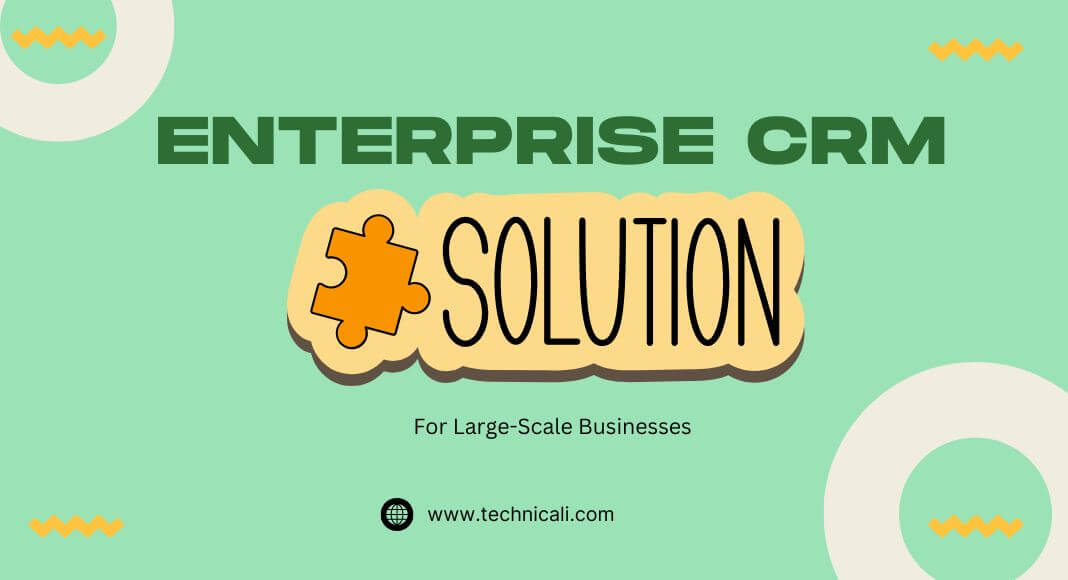Enterprise CRM has evolved from being a mere repository of contacts to include a variety of CRM functions. It has become a cornerstone for business development, allowing massive organizations to hone customer relationships, automate sales processes, and organize critical customer data. Recent global surveys indicate that more than over 70% of CRM platforms will integrate AI to optimize productivity and growth by 2025. As organizations expand, they often face challenges such as cross-departmental integration, alignment with existing software tools, and rigorous security requirements.
Contents
Why Enterprises Need a Robust CRM in 2025
The Evolving Role of CRM in Enterprise Digital Transformation
CRM has evolved into a centralized intelligence hub that extends far beyond traditional contact management. Many CRM platforms now incorporate artificial intelligence, hyper-personalization, and predictive analytics, all of which help enterprises handle massive sales pipelines and complex processes. This transformation addresses typical pain points, such as the need to integrate existing ERP software, reduce operational costs, and unify data from disparate sales channels. Indeed, enterprises that implement a scalable, enterprise-level CRM solution often experience enhanced efficiency and reduced overhead.
Key Features to Look for in an Enterprise CRM
Today’s enterprise-class CRM software should support thousands of users spread out over many different teams with enough flexibility to suit changing business demands. Scalability is vital in that a limited pilot program is likely to proliferate and rapidly become an enterprise-wide installation. Customizable business processes are the other critical attribute because different departments might require dissimilar setups. AI and predictive analytics are becoming standard, helping you forecast sales performance and streamline complex crm process tasks.
Security and compliance cannot be overlooked, especially in industries like finance or healthcare. Many CRM solutions typically offer end-to-end encryption and alignment with regulations like GDPR. Additionally, cloud-based deployment has soared in popularity, allowing a distributed team to access data and collaborate in real-time. This shift in approach not only simplifies integration with other business tools but also ensures that the software provides a comprehensive view of the customer.
Best 7 Enterprise CRM Solutions for 2025
1. Salesforce Sales Cloud
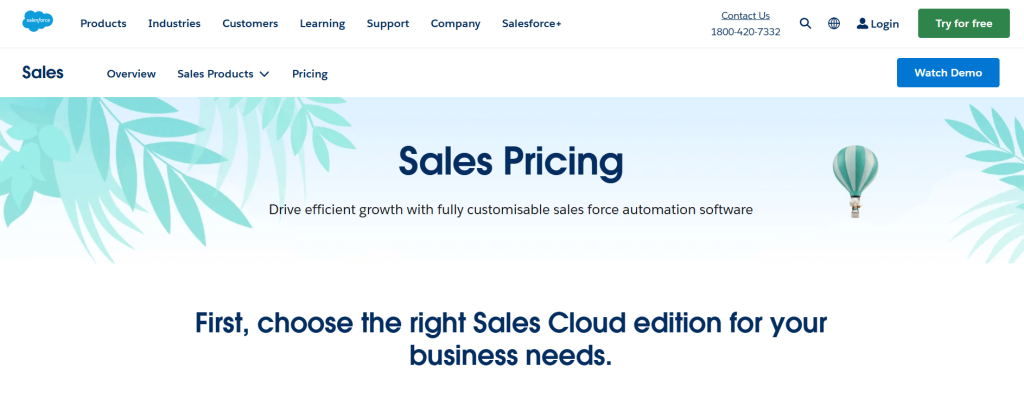
Salesforce Sales Cloud is a popular CRM software that is adopted by international firms to automate the sales process and enhance customer handling. It is usually deployed through a cloud subscription model, so businesses of different sizes can benefit from real-time access to sales information. Firms apply it to streamline processes, project revenue forecasting, and coordination between different departments without requiring huge on-premise installations.
Features of Tool
- AI-driven analytics (Einstein) for sales forecasting
- Customizable dashboards and reporting
- Scalable architecture for enterprise teams enhances collaboration tools for efficient project management.
- App Exchange ecosystem with numerous integrations
- Automated lead management and nurturing
Assets
- Robust app marketplace with many specialized solutions.
- Deep integration capabilities with external systems.
- Extremely flexible to accommodate individual business processes, enterprise-level CRM software offers customized solutions.
- Offers extensive training resources for user enablement.
- Cloud-based deployment minimizes the IT overhead of maintenance, thus becoming a popular option with CRM vendors.
Liabilities
- It can be expensive for large enterprises with many users.
- Advanced customizations may require professional developers.
- Complexity can lead to longer onboarding times.
- A Feature-rich environment might overwhelm smaller teams.
- Certain features are locked into higher-tier pricing plans.
How does it differ from the below tools:
Salesforce Sales Cloud stands out for its extensive add-on marketplace and advanced AI forecasting. Its robust ecosystem can be more comprehensive than some other platforms, though it often comes at a higher price point. It places great emphasis on enterprise customization, making it appealing to very large organizations.
2. Microsoft Dynamics 365
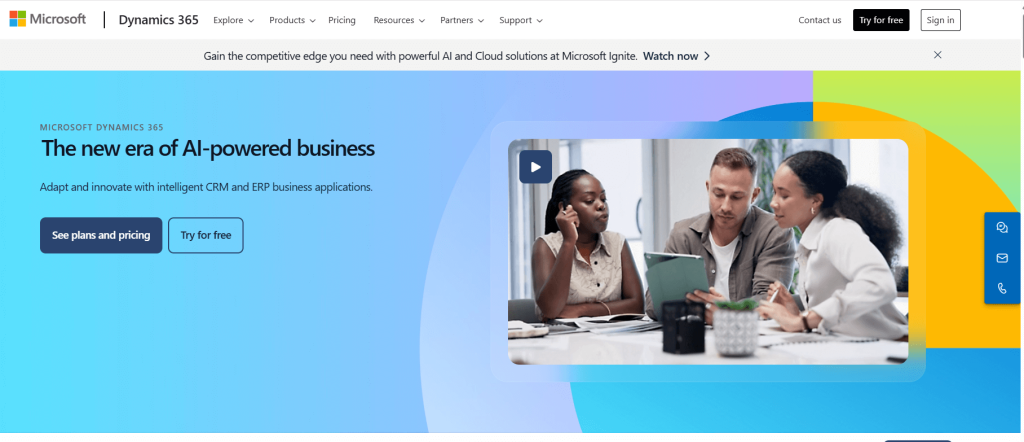
Microsoft Dynamics 365 combines CRM and ERP functionalities under one umbrella. It integrates tightly with Office 365, Power BI, and Azure, making it especially appealing to organizations already invested in Microsoft’s broader ecosystem. Implementation usually involves configuring various modules that support sales, marketing, operations, and finance.
Features of Enterprise Microsoft Dynamics 365:
- Unified interface for sales, marketing, and service
- Native integration with Microsoft tools like Teams and Outlook
- Built-in AI-driven sales insights and analytics will enhance the functionality of CRM software in 2025.
- Customizable workflows tailored to specific industries enhance the effectiveness of CRM features.
- Power Apps and Power Automate for low-code process automation
Assets
- Strong synergy with widely used Microsoft software enhances the functionality of the best CRM software.
- Scalable design is suitable for both mid-sized and large enterprises.
- Built-in reporting and analytics with Power BI integration.
- The modular approach lets organizations implement only needed components.
- Regular updates keep features and security current.
Liabilities
- Licensing can be complex to navigate.
- Non-Microsoft users may face a steeper learning curve.
- Upfront customization may require specialized consultants.
- Full functionality might need multiple additional licenses.
- System performance can vary based on integration complexities.
How does it differ from the other tools:
Microsoft Dynamics 365 offers a strong appeal to companies entrenched in the Microsoft environment, unlike some other CRMs that focus on standalone functionalities or open-source customization. Its cohesive integration with Microsoft 365 tools is a prime differentiator, making data flow seamless for users already working in that ecosystem.
3. SAP CRM
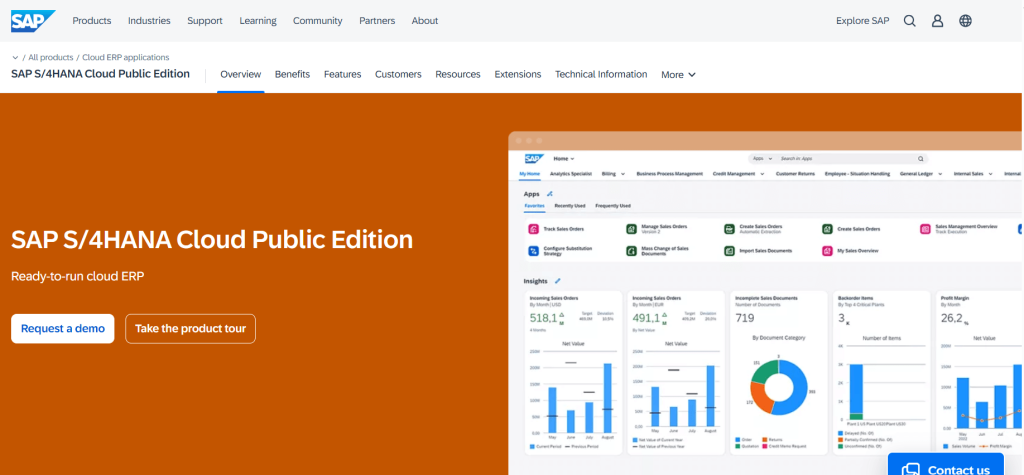
SAP CRM is one of the comprehensive enterprise applications offered by SAP, which assists organizations in simplifying and safeguarding mission-critical processes. It is generally deployed in conjunction with SAP ERP and supply chain solutions to maintain data continuity and regulatory compliance for organizations with rigorous regulatory requirements. Its key advantages are strong data security, advanced process automation, and worldwide scalability.
Features of Enterprise SAP CRM:
- Seamless integration with other SAP modules (ERP, SCM) enhances the capabilities of customer relationship management software.
- Advanced analytics and reporting for sales pipelines
- Customizable dashboards for different roles and departments
- Embedded AI functionalities for demand and forecasting
- Support for multi-channel interaction with customers
Assets
- Provides end-to-end business coverage when used with other SAP products.
- High level of data protection and compliance alignment.
- Strong track record in industries such as healthcare and finance.
- Scalable solutions that fit large, global corporations.
- Well-established support and partner network worldwide.
Liabilities
- Typically requires a substantial IT budget.
- Implementation complexity can be high.
- The learning curve may be steep for first-time SAP users.
- Integrations outside the SAP ecosystem can be cumbersome.
- Not always as flexible for smaller or niche businesses.
How does it differ from other tools:
SAP CRM’s biggest advantage is its tight integration with the SAP ecosystem, making it ideal for enterprises already leveraging the best enterprise CRM software. This seamless connectivity stands out against other CRM tools that might require extensive third-party integrations for similar functionality.
4. HubSpot Enterprise CRM
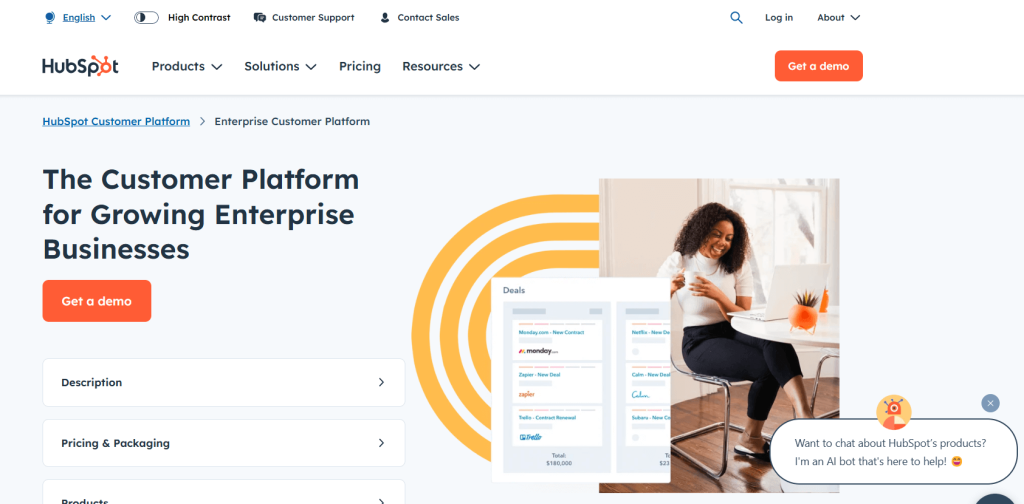
HubSpot Enterprise CRM is centered around bringing sales, marketing, and service together into one easy-to-use platform. It is usually implemented as a cloud-based subscription model in which firms can choose and select from multiple “Hubs.” HubSpot’s strength lies in offering simple interfaces and influential marketing automation features.
Features of Tool
- Integrated CRM, marketing automation, and customer service modules
- Drag-and-drop interface for building email campaigns and workflows
- Native analytics for lead scoring and lifecycle tracking
- Centralized contact database supporting cross-team collaboration
- Extensive library of educational resources and certifications
Assets
- Very intuitive user experience reduces training needs.
- Helpful marketing automation tools for nurturing leads.
- Easy implementation for smaller teams or departments.
- Clear, transparent pricing models.
- Active online community and support channels provide valuable resources for CRM data management.
Liabilities
- May lack depth in advanced enterprise features.
- Higher-tier options can become expensive for large user counts.
- Some specialized integrations require additional plugins.
- Not as customizable as certain open-source customer relationship management solutions.
- Most robust features are confined to upper-tier plans.
How does it differ from other tools:
HubSpot’s simple interface and strong marketing focus distinguish it from software platforms that lean more toward deep, technical customizations. While other CRMs excel in complex enterprise resource planning, HubSpot often wins with ease of use and marketing-led automation, making it a top choice among CRM providers.
5. Zoho CRM
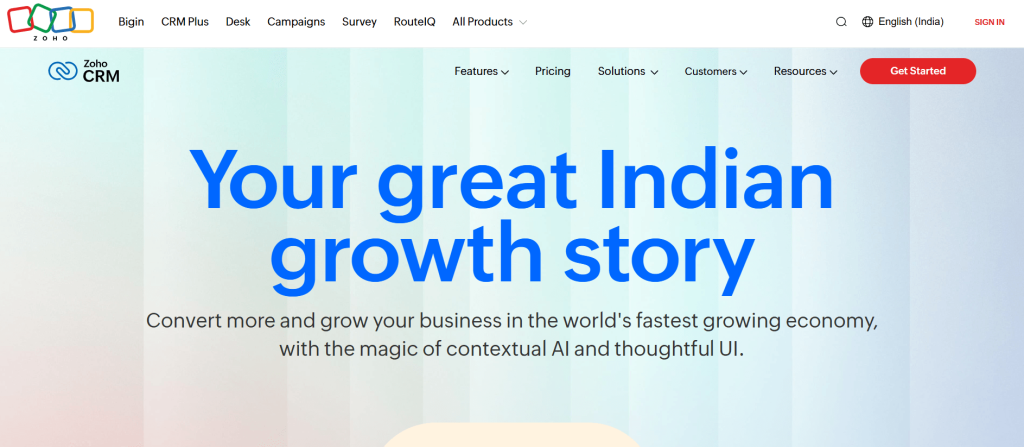
Zoho CRM supports a variety of businesses but has gained traction among cost-sensitive businesses. It is easy to implement with cloud-based deployment and many companion apps within the Zoho ecosystem. It focuses on low-code automation and AI-powered insights through its AI assistant, Zia.
Features of Zoho CRM
- Customizable modules with drag-and-drop interface are key features of the best CRM software for 2025.
- Zia AI for intelligent lead scoring and predictions
- Tight integration with Zoho’s larger suite (Books, HR, etc.)
- Low-code workflows for tailoring automation
- Flexible pricing for different stages of business growth
Assets
- Typically more affordable than most enterprise offerings.
- Easy integration with other Zoho products.
- User-friendly interface reduces adoption barriers.
- The low-code design supports rapid deployment of CRM features to meet user needs.
- Scalability options accommodate both small and large teams.
Liabilities
- Might require additional modules for certain advanced features.
- Analytics can be less comprehensive than some competitors in the realm of enterprise customer relationship management.
- Fewer pre-built integrations with niche third-party apps.
- Customer support can vary based on plan tier.
- Some large-scale organizations may outgrow their upper limits.
How does it differ from the others:
Zoho CRM’s main draw is its cost-effectiveness and integrated ecosystem, standing in contrast to more expensive, specialized CRM platforms. While it might not offer as many deep enterprise functionalities as some alternatives, it shines for businesses wanting a balance of features and affordability.
6. Oracle NetSuite CRM
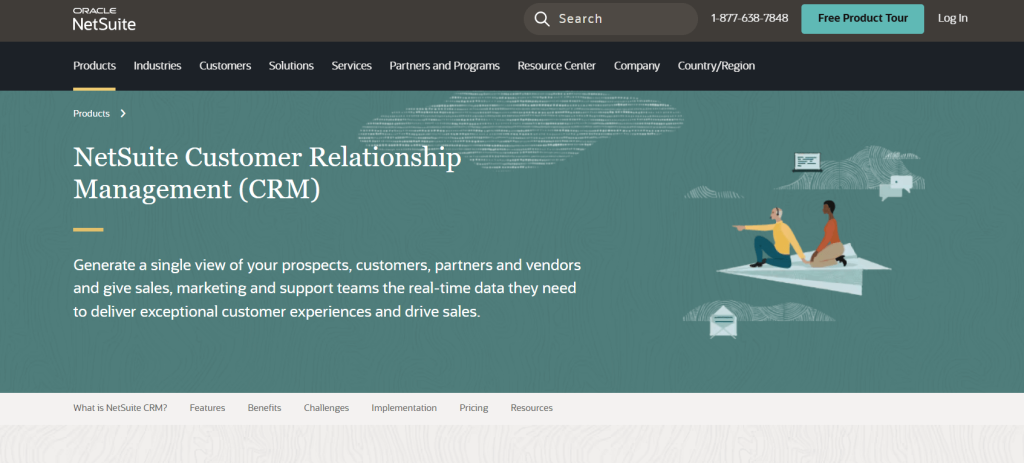
Oracle NetSuite CRM focuses on data-driven decision-making, predictive analytics, and a unified platform for sales CRM, marketing, and service. It is typically implemented by mid-market and enterprise organizations looking for end-to-end visibility across finance, operations, and customer data in one environment. NetSuite’s cloud-first approach simplifies management and updates.
Features of Enterprise Netsuite CRM
- Unified dashboards integrating sales CRM and financial information for improved analysis.
- AI-based lead scoring and forecasting
- Real-time insights into customer interactions and inventory
- Automated workflows for quote-to-cash processes
- Global compliance tools for multi-country operations
Assets
- Proven track record in cloud-based ERP and CRM solutions.
- Suited for companies looking to unify financial and sales data.
- Strong multi-currency and multi-subsidiary support are essential CRM features for global businesses.
- Continual upgrades ensure cutting-edge features.
- Advanced reporting and analytics built into the platform.
Liabilities
- Implementation can be time-consuming and costly.
- specialized expertise or external consultants may be required for the effective implementation of the best enterprise CRM software.
- Some features need separate modules or premium tiers.
- User experience can be less intuitive compared to simpler CRMs.
- Licensing structures can become complex for larger implementations.
How does NetSuite CRM differs from the other tools:
Oracle NetSuite CRM merges CRM and financial insights more directly than many other platforms. This tight integration appeals to companies wanting consistent, real-time visibility into their financial health alongside their sales pipelines.
7. Odoo
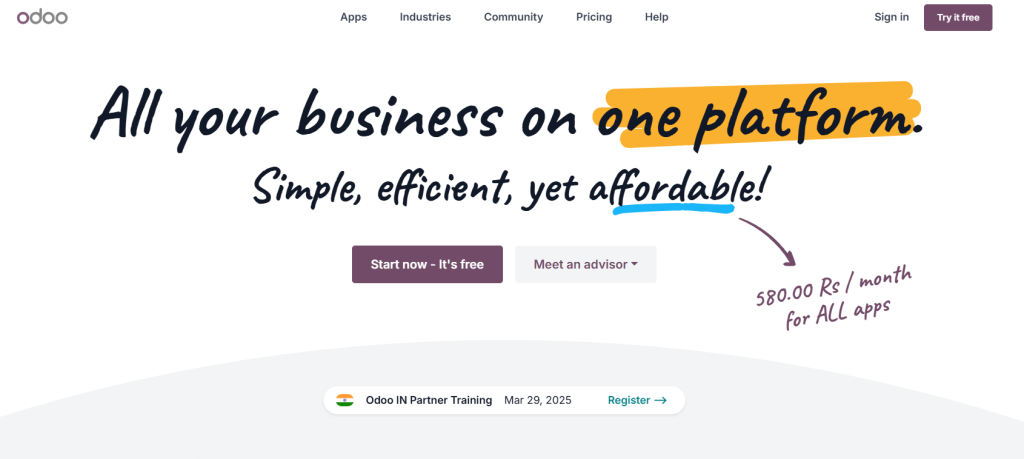
Odoo is an open-source business apps suite that offers CRM, accounting, eCommerce, inventory, and more under one platform. Implementation is cloud-based or on-premise, offering companies the option to choose modules that fit their precise requirements. The open-source environment enables rich customization.
Features of Odoo Tool
- Modular structure for CRM, finance, inventory, etc.
- Community and enterprise editions with varied functionality
- Open source flexibility for deep customizations
- Integrated marketplace with ready-made modules
- Intuitive interface for coordinating multiple business operations
Assets
- Freedom to modify source code to match unique needs.
- Huge community that provides plugins and support.
- Cost-effective solution, especially in the open source model.
- Modular design helps avoid paying for unneeded components.
- Transparent, user-friendly interface suitable for various teams.
Liabilities
- It may require technical expertise for advanced customizations.
- Official support is typically limited to paid enterprise versions.
- Some integrations with external professional tools may need custom codes, which makes it difficult to implement CRM without careful planning.
- The quality of third-party modules can vary.
- Some features may lack the polish of the best CRM solutions compared to top proprietary solutions.
How does Odoo differ from other tools:
Unlike closed-source CRMs, Odoo’s open-source foundation promotes flexibility and cost-effectiveness. Its modular architecture is especially appealing for businesses wanting to build a tailored enterprise customer relationship management system without being locked into predefined packages.
How to Choose the Right Enterprise CRM for Your Business

Define Your Enterprise CRM Needs
Determining the best fit starts with identifying the precise goals your enterprise has in mind. Do you need an enterprise CRM for AI insights that deliver targeted sales strategies? Or do you require a CRM platform that integrates seamlessly with existing ERP solutions? Conduct an internal assessment of your current business tools, data flows, and organizational objectives. This crucial step ensures you choose the right one, aligning with budget, compliance requirements, and performance metrics.
CRM Implementation Challenges and How to Overcome Them
Adopting a new CRM solution can trigger multiple obstacles, from high costs to staff pushback. Although some enterprise CRM vs. small business CRM distinctions center on price, enterprise organizations also wrestle with data migration complexity. To minimize disruptions, develop a clear roadmap before rollout. That includes stakeholder buy-in, user training, and step-by-step integration. Selecting a robust CRM system that can integrate your legacy technology helps avoid data silos, ensuring each team has a consistent view of the customer. Implementation success often rests on continuous support and improvement rather than a one-and-done deployment.
Future-Proofing Your CRM Investment
Future-proofing a CRM can be critical for sustained business growth. Solutions usually come with expansions of AI so that you can leverage the next generation of analytics and respond to evolving market scenarios. Opt for enterprise CRM software features that enable advanced data security protocols since your company might need to comply with varied regulations. Another benefit of a modern system is the capacity to integrate with a variety of platforms, from marketing automation to supply chain. A robust enterprise approach ensures you can scale your use of CRM strategy as your organization evolves, whether that involves new lines of business, diverse geographic markets, or unexpected technological shifts.
FAQs on Enterprise CRM Solutions
What is the best enterprise CRM in 2025
Many providers, including Salesforce, Microsoft, and SAP, stand out in this space as leaders in customer relationship management software. The top choice ultimately depends on industry-specific requirements, existing infrastructure, and budget constraints.
How much does an enterprise CRM cost
Enterprise-level pricing varies widely among different CRM providers. A CRM solution might cost around 50 dollars per user per month at the lower end, while larger deployments can exceed 500k for sophisticated, fully integrated CRM tools.
Can an enterprise CRM integrate with my ERP
Yes, many CRM systems offer the ability to integrate with popular ERP software. Solutions like Microsoft Dynamics 365, SAP CRM, and Salesforce often come with pre-built connectors, making it easier to unify CRM data between the platforms.
Which CRM is best for AI-powered sales forecasting
Oracle CX Cloud and Salesforce Einstein AI are strong contenders for advanced, AI-driven insights. These solutions allow your team to access accurate projections of customer interaction patterns, thereby improving overall sales planning.
Conclusion

Choosing an enterprise CRM system for a big business can make a big difference in how you handle customer relationships, fuel sales growth, and bring together multiple channels of customer data. Regardless of whether you value sophisticated AI capabilities, stringent security measures, or intuitive interfaces, each of the above options has unique benefits to suit your enterprise and smb sales landscape. As the business landscape changes, be sure to select the proper system through attentive evaluation of important considerations such as customization, compliance, and integration capacity.
The ideal enterprise CRM will not only bring together fragmented teams but also support sustainable growth, keeping customer experience at the core of every interaction. If you are looking to stay ahead in a competitive market, consider the solutions listed here, adapt them to your specific business context, and keep an eye on how they can help you deliver exceptional value to every customer. By moving forward with a robust enterprise CRM, you may discover new ways to innovate, streamline operations, and inspire confidence among your stakeholders, paving the way for long-term success and stronger customer relationships.

